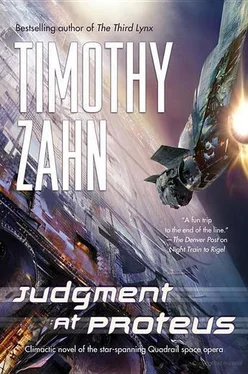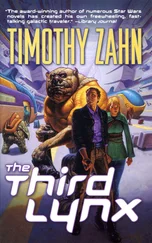The fourth was racing desperately toward McMicking when Morse fired two more thudwumpers into him. He sprawled onto his face on the deck, sending a splash of blood in all directions, and lay still. Taking a deep breath, I looked up at the monitors, wondering even now if it had all been for nothing.
It hadn’t. All across the ship, in every room where the isolated groups of would-be conquerors and their newly freed slaves had gathered, the Shonkla-raa were fighting for their lives.
And they were losing. The Hardin security force—not the Hardin pilots and navigators that I’d carefully led Riijkhan to expect, but McMicking’s best combat experts—had had eight weeks of intensive training in the new and undetectable weapons the techs had created and hidden in their jumpsuits. Fayr and his commandos had no such exotic weaponry, but they had their own highly honed combat training plus the intimate knowledge of Shonkla-raa physiology that we’d obtained from Yleli and his late companions aboard the Homshil train.
Five minutes later, it was all over.
Almost.
“Frank,” Bayta murmured, touching my arm, her eyes on Riijkhan. “He’s still alive.”
I looked down. Riijkhan’s breathing was fast and shallow, and the thudwumper holes in his chest were still oozing blood. But his eyes were open, and he was gazing up at me with disbelief and hatred. “Any last words?” I asked, crouching down beside him.
His hand twitched, as if he was hoping for one last shot at me. But the strength necessary for an attack was long gone. “No?” I asked. “In that case, I have a few. You made two mistakes, Osantra Riijkhan. You and the rest of the Shonkla-raa. Your first mistake was in focusing exclusively on what I was planning, and never even considering the possibility that the Modhri might have plans of his own.”
I looked up at the monitors and the dead and dying Shonkla-raa. “Your second mistake was a philosophical one,” I said quietly. “You understood masters and slaves and non-slaves. But you never understood freedom. That’s what people will fight for. That’s what they’ll die for.”
There was a gurgle from below me, and I looked down to see Riijkhan’s eyes close again. “I suppose we should put an end to it,” I said, standing up again. “Morse?”
“No,” Morse said flatly.
I looked over at him. He was standing off to the side, his Beretta still gripped in his hand, staring down at the dying Shonkla-raa. “No?” I asked carefully.
“No,” he repeated, looking up at me.
And as I gazed at his face, I understood. The Modhri, once Morse’s silent puppeteer, had emerged hesitantly from the shadows to become his ally and, eventually, his friend. A closer friend even than he’d been to me. “Because if you don’t shoot it’ll take longer?” I asked.
A small, pitiless smile touched the corners of Morse’s mouth. “And because it’ll hurt more,” he said grimly. “Let him die on his own.”
And we did.
The victory had been costly. Sixty of our two hundred men and women had been injured, along with nine of Fayr’s thirty commandos. Twenty-one Humans and twelve Bellidos also lay dead. More lives, I reflected bitterly, for me to add to my conscience.
But the lives hadn’t been given in vain. The Shonkla-raa, all of them, were dead.
And the galaxy was once again safe. At least, for now.
“We’ll need to send the defenders back to the Tube as soon as possible,” Bayta said as she and I wearily headed through the now silent tunnel toward the parked vehicles that had brought us here. It was night outside, and I could feel the cool desert air flowing in across our legs. “They’ll be able to organize special transport for the wounded once everyone’s able to travel.” She hesitated. “We’ll need to deal with the bodies, as well.”
“McMicking and Fayr will probably want to handle that personally,” I told her. “They can laser whatever requests they have up to the station, and from there to Earth and whoever’s been backing Fayr’s group.”
“All right.” Bayta paused. “I never thought the Modhri would be willing to do something like that.”
“I was rather surprised myself,” I admitted. “The Modhri as a whole won’t be affected much, of course. But it’s still very impressive that an entire mind segment would be willing to sacrifice himself for us.”
“Because he understood freedom,” she said quietly.
“Yes,” I agreed. “The big question now is whether or not he understands responsibility.”
Bayta hunched her shoulders uncomfortably. “You mean whether he’ll be willing to eliminate the colonies inside people who don’t want them?”
“That’s part of it,” I said. “He may also have trouble with some of his more far-flung mind segments who may resist these changes.”
Bayta gave a small almost-laugh. “You make it sound like he’s heading for a civil war.”
“That is a very weird image, all right,” I agreed. “But it may not be all that far off.”
“He’ll come out of it all right,” Bayta assured me. “And I think he’ll be all right with his colonies, too. Agent Morse is already talking about going back to Yandro to get another colony for himself, and some of the Hardin Industries people were saying the same thing. They seemed to like the kind of instant communication and information access they could get from their symbionts.”
“Their symbionts ?” I asked, frowning. “I thought Riijkhan used the older version of Modhran coral on them.”
“He did,” Bayta said. “But Agent Morse’s hybrid colony was able to influence the rest of the mind segment into creating the same relationship with the others that he and his colony already had.”
“I didn’t know a Melding colony was strong enough to do that,” I said. “In that case, scratch my concerns about the far-flung Modhran colonies. That solves a lot of problems right there.”
“Yes,” Bayta said. “I’m mostly relieved that we won’t have to worry about the Elders creating more defenders.”
“Amen to that,” I agreed. “Like I told the Elder at Yandro, I like the Spiders and Quadrail just the way they are.”
“And the Elders, too?” Bayta asked, her voice suddenly a little odd. “Do you like them? Even when they try to kill you?”
I threw a sideways look at her. “What are you talking about?” I asked cautiously.
“You don’t need to deny it,” she said. “I was right there, this afternoon, when you offered to tell Osantra Riijkhan about the Shonkla-raa origins. I saw the reaction of the defenders, moving toward you even though I’d ordered them to stand still. And I also saw they were so intent on silencing you that they continued moving even over the first few seconds of the command tone. That implies whatever you were about to say was a secret they very much wanted kept hidden.”
She took a deep breath. “Which can only mean that it was the Chahwyn. They were the ones who created the first Shonkla-raa.”
I grimaced. So there it was. The Elder had promised me death if I told their secret. And now Bayta knew it. There was no way they weren’t going to jump to the wrong conclusion on that one. “You never heard that,” I told her firmly. “Not from me, not from anyone. You weren’t supposed to ever know that.”
She shook her head. “You’ve trained me too well,” she murmured. “I see things now. I hear things. I understand things.”
“And sometimes all that cleverness is a damn curse,” I said harshly. “If the Chahwyn find out you know—”
“They won’t find out,” she said quietly. “Not until it’s too late for them to do anything.”
Читать дальше


